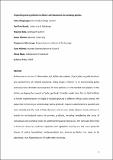Unpacking policy gridlocks in Africa’s development: An evolving agenda
Publication Date
2018-09-01Author
Julius Mugwagwa, Geoffrey Banda, Maurice Bolo, Susan Kilonzo, Clapperton Mavhunga, Vuyo Mjimba, Olivia Muza, Zeferino Teka
Metadata
Show full item recordAbstract/
Policies are not an end in themselves, but deliberate systems of principles to guide decisions and achievement of rational outcomes. Many factors inherent in or transcending policy processes have dramatic consequences for how policies are interpreted and applied. In this article, we deploy the concept of ‘policy gridlocks’ to better understand factors that facilitate or hinder implementation of single or multiple policies in different African policy arenas. We argue that minimizing or ameliorating ‘policy gridlocks’ requires stakeholders to quantify and more directly feel the cost of their decisions and actions, while scholars must continue to search for institutional means to prevent gridlocks, including broadening the array of conceptual and analytical tools for understanding policy processes. We conclude that limits in financial resources, technical expertise and legislative capacity are the more powerful drivers of policy …
Collections
Related items
Showing items related by title, author, creator and subject.
-
The single most influential school-based factor affecting student achievement is teacher quality. Teacher quality is a function of, among other variables, the training programme, teacher experience and the competence of the teacher educator. The quality of pre-service training to prospective teachers in teacher training institutions goes a long way to influence their performance in the field. This research paper examines the role of academic qualifications of college tutors, areas of specialty i.e. their major and minor teaching subjects at the college/university level , and the assigned subject area. The paper also evaluates the effectiveness of the Teachers Service Commission deployment policy. This is a case study of Mosoriot Teachers Training College, in Nandi County, Kenya. Data was collected by use of questionnaires, face-to-face interviews and staff establishment records. Of the total teaching force of 71, 65 (91.5 %) tutors participated in this study. The data was descriptively analysed using percentages. The findings reveal that a) there is great disparity between teacher recruitment and deployment policy and practice where the college tutors were not teaching subjects for which they were not deployed to teach, and b) there was out-offield teaching in teacher education institutions. The researcher recommends that the Teachers Service Commission re-examine the staffing norms in Teachers Training Colleges with a view to maximize the human resource and enhance quality of training
Shaban Kwalia, Joseph Amulioto Opanda (Model Institute of Education & Research, 2016)The youth are facing many social, economic and educational problems. These problems are turning the youth into delinquents and misfits in society. This study is aimed at identifying the counselling services needed by ... -
-

